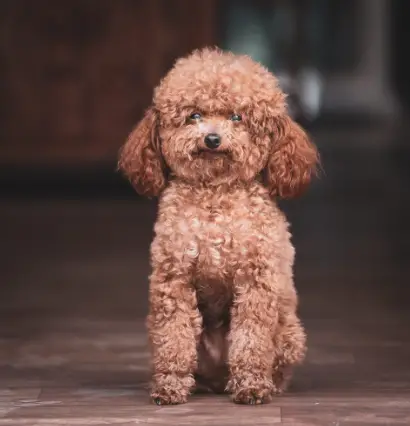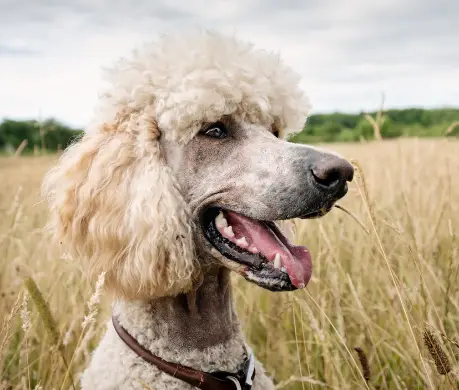Your puppy or dog looks great because you work hard to keep it clean. However, there is a peculiar stench emanating from someplace, and you are baffled as to why your Poodle smells so bad. If so, you are not by yourself.
There are several typical causes for a Poodle’s peculiar odor.
This section will cover all of the most prevalent causes and the precise measures you can follow to get your Poodle smelling fresh and clean once more. You might be able to discern where the smell is coming from or it might be difficult to pinpoint exactly where it is flowing from.
Do Poodles Have An Odor?
Poodles are frequently accused of having bad canine smells. Even if you bathe your poodle more frequently than the majority of poodle owners, your dog still stinks. There are numerous potential causes for this. You don’t have to give in to having a smelly dog until you’ve completed all the requirements.
There are a few things to consider when maintaining your poodle’s cleanliness. This list has been thoughtfully compiled for your convenience. However, keep in mind that some solutions necessitate a visit to the veterinarian. Poodles are special pets that adore their owners and take the proper care of them to keep them smelling fresher for longer.
What Are The Causes Of Stinky Smell In Poodles?
Even though they are adorable and cuddly, there are a few reasons why Poodles could stink. Let’s examine the query, “Why does my Poodle stink?” in more detail.
- Bathing Your Poodle Incorrectly
The Poodle produces sebum, a bodily oil for their coat. The oil that is released via the skin is made by the sebaceous glands. The oil serves as a barrier against dirt and particles and prevents the skin from drying out.
If the Poodle isn’t regularly bathed, the buildup of these oils will result in a musty, sour scent when the dirt and dander penetrate the coat. Popular Poodle discussion boards advise bathing your Poodle once every three weeks. Your pet will maintain a healthy, shiny coat and a fresh scent with regular baths.
When giving your dog a wash, it is usually advised to use products made especially for dogs. These products are always gentle on the skin and will have the proper components to get rid of dirt and grime.
- Poodles smell because of skin infections
Your Poodle may smell if it is not properly groomed or has other skin issues. Common skin conditions in Poodles can be brought on by a variety of circumstances. These skin conditions may be brought on by bacterial, fungal, or yeast infections.
If these infections are not treated, the skin will become dry, itchy, and red. The most typical type of infection in Poodles is a staph infection. Since excessive moisture in the coat can lead to staph infections, fully drying your Poodle is just as crucial as bath time.
Consult your veterinarian as soon as symptoms appear since most skin infections can be treated with oral or topical treatments.
- Too Much Flatulence
All dog breeds have some flatulence, some of which will have you frantically searching for the air freshener. Poodles typically expel gas ten or more times daily to get rid of extra gas and clear their intestines.
The quantity and smell of these offensive fumes are regulated by the quality of dog food. Oxygen, carbon dioxide, methane, and hydrogen sulfide are the main components of flatulence. These undetectable yet lethal fumes may be caused by your pet eating dinner too quickly or by an allergy to the components in dog food.
- My Poodle Has Bad Breath
There are various misconceptions regarding your Poodle’s mouth. The largest fallacy is that a dog’s mouth is cleaner than a person’s mouth.
The mouth of your pet is not cleaner than yours!
The American Kennel Club (AKC) claims that a dog’s mouth is home to a variety of bacteria and microbes. Most of the time, your Poodle’s bad breath is unrelated to anything.
Your dog’s breath may occasionally smell foul if foreign things become lodged between his teeth. Gingivitis is brought on by the buildup of tartar, which is caused by bacteria from food and saliva. Tooth decay and gum infections can happen if they are not treated.
If you are uncomfortable with at-home brushing methods, the majority of veterinarians offer expert dental cleaning for your dog. Additionally suggested measures include mouthwash in the water and dental treatments.
Like humans, dogs need to have good oral hygiene. If your pet’s breath starts to smell, consider looking into it.
- Anus Glands and Vaginal Smells
Every dog has anal glands. When two canines come together, a fluid held in the glands at your pet’s bottom end progressively releases. Additionally, tiny amounts are expelled when your dog urinates. The fluid buildup brought on by your pet’s loose stools might occasionally result in the anal glands rupturing. The fluid has an unpleasant, overpowering stench that is sometimes compared to skunk odor.
Veterinarians frequently release extra fluid during routine visits to assist reduce the fluid buildup in the anal glands.
Another possible cause of the odor coming from your Poodle’s hind end is stool caught in the hairs around the anus. To prevent the stool from becoming trapped, you can gently cut the hair in this area or thoroughly clean the area after your pet uses the restroom.
How To Keep Poodle Smelling Nice And Fresh
While you might think the sweet-smelling Poodle you spotted in the neighborhood dog park is just naturally scented, it’s probable that its owner has had a hand in it. There are a few straightforward actions we can do to keep our Poodle odor-free.
- Several times a year, get your Poodle professionally trimmed. Their fur is kept short to avoid getting tangled in dirt and other objects. The groomer might also remove any additional fur from your Poodle’s ear canals if they have a history of ear infections.
- Once each month, give your Poodle a bath with a hypoallergenic shampoo. Compared to other breeds, poodles require more frequent bathing to remove extra oils and yeast from their skin.
- Every day, brush your poodle’s teeth. This is crucial, and it should be practiced from an early age. There are brushes and pastes made specifically for dogs. Dental chews and items like “Plaque Off” also contribute to good oral health.
- Regularly have your Poodle’s anal glands drained if necessary. As soon as your Poodle exhibits symptoms of gland disease, like as bum scooting, this should be done.
- Every day, brush your poodle. This distributes their natural oils and maintains the health of their skin and coat. This can delay the onset of several skin conditions over time.
- If possible, avoid the trigger and treat any underlying allergies. This can entail giving your Poodle a hydrolyzed diet and wiping their paws and bellies when they enter the house from the outside.
- Make sure your Poodle is using high-quality parasite prevention.
- Ensure that your Poodle has routine health examinations. This often entails a visit once or twice a year for adults. Senior Poodles, however, will require more frequent visits to the vet than this.
Conclusion
Poodles are the greatest companions for families with young children and individuals who have allergies because they are the most hypoallergenic breed of dog. While they are dependable, entertaining, simple to teach, and low shedders, they do need adequate upkeep.
Your Poodle will live a long and healthy life with frequent vet visits, a high-quality diet, and good grooming—stink-free.







